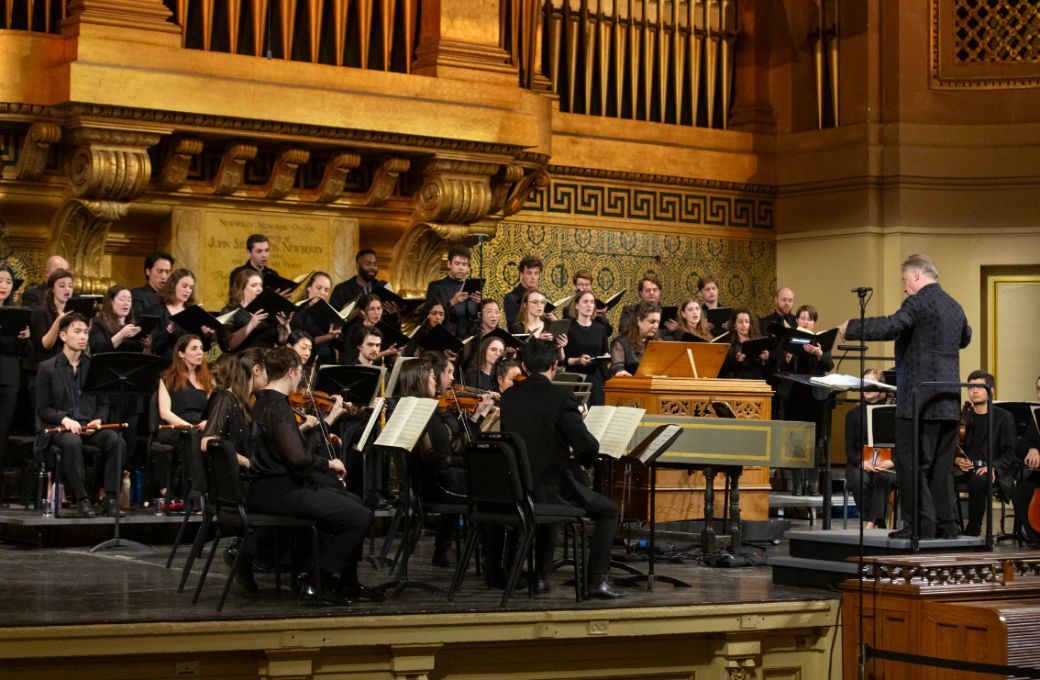Period instrument study and performance is a relatively new addition to the curriculum at the prestigious Juilliard School. Founded in 2009, Juilliard415 (415Hz being the Baroque A) is the school’s principal Baroque ensemble which has a growing international reputation, collaborating with leading early music performers and experts to tackle both mainstream and rare early works. A natural partner is Schola Cantorum from Yale, a choir founded in 2003 specialising in sacred music, sponsored by the Yale Institute of Sacred Music celebrating its 50th anniversary. Some 30 singers, many studying Early Music Voice or Choral Conducting, sang in this performance in Perth, the penultimate in a six-night UK tour of Bach’s Mass in B minor.

The work is now part of the popular mainstream, but one Bach never heard performed complete. Indeed, you have to question why Bach – in Lutheran Leipzig with a growing sheaf of liturgical cantatas – would be drawn to compose a Catholic Mass. A two-part work, the Kyrie and Gloria was performed in Dresden in 1733 (Luther had approved the Kyrie and Gloria for use in Protestant churches), but it was not until the end of Bach’s life that he completed the work including the addition of his 1724 Sanctus. Finished in 1749, it was only first performed complete in Leipzig in 1859. Scored for a colourful orchestra including three natural trumpets, three oboes d’amore, horn and timpani, the 30-strong Juilliard415 with gut strings and three spike-less cellos were a terrific powerhouse. It is a work demanding considerable choral stamina with divisions of parts increasing the load, but Schola Cantorum rose to the occasion perfectly, providing four walk-out solos from the ranks.
David Hill, the choir’s conductor, took a steady pace, allowing the music to flow organically, sensitively shaping each movement with care. What made this performance special was Hill’s rehearsal blank canvas as all his young performers were coming to the work for the first time, the eager freshness from players and singers giving the music an exciting vibrant edge. Setting the tone, the slow choral weave of the opening Kyrie with mellow woodwinds and strings allowed the different choral parts to surge and retreat, the sequential entries on the return were secure and balanced with superb diction. Choral detail was precise throughout from the slow majestic build of Gratias agimus tibi to the thrilling bounce of the entries in Cum sancto spiritu followed by a measured muscular Credo with sensitive dynamics.
Juilet Ariadne Papadopoulos, Sandy Sharis, Michaël Hudetz and Jared Swope were the soloists for this performance (there was a tour double cast), stepping out to the front along with supporting instrumental soloists. Papadopoulos and Sharis blended sweetly in their duets, Hudetz' light plangent tenor intertwining with Nuria Canales Rubio’s beguiling flute in the Benedictus, and Swope’s breezy baritone perfect for the extraordinary sound world of Quoniam tu solus sanctus with two bassoons and Carys Sutherland’s obligato horn. Sharis’ molten rich alto with the oboe d’amore in Qui sedes and against unison violins in the Agnus Dei was truly touching.
Hill’s direction was masterful, guiding his young musicians through this extraordinary piece, each part with its own musical flavour. The big set pieces were indeed memorable, the double choir going full tilt in the Osanna with the three trumpets blazing, and the final Dona nobis pacem gloriously radiant. It was magnificent to hear the work, as ever, but even more wonderful knowing this was the first Mass in B minor for all players and singers.


